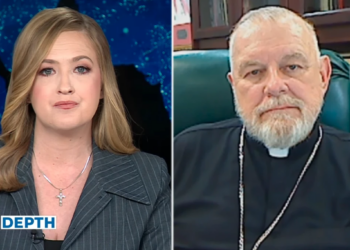In the struggle for narrative dominance and interpretive control, the EU/Europe is pursuing a hard and consistent line. Dissenting voices and a growing opposition are met with narrowing discursive spaces. The new German government is also aligning with the Brussels chorus.
One thing cannot be said about Brussels and its national subsidiaries: inconsistency. Once a shared agenda is agreed upon and a procedural consensus is found, institutional and media-based defense mechanisms are built in parallel. These serve to immunize and narratively shield the actors, institutions, and beneficiaries involved in the machinery that transforms political will into reality. (RELATED: Free Speech Restrictions Are a Problem)
SLAPP Lawsuits as Smokescreen
This is the context in which the German government is now operating. Chancellor Merz’s administration is preparing the national implementation of a largely underreported EU directive. It concerns so-called SLAPP lawsuits — Strategic Lawsuits Against Public Participation — legal intimidation tools used by powerful actors to silence critics, journalists, or whistleblowers through financially exhausting court proceedings. These lawsuits aim not at legal victory, but at creating pressure, fear, and ultimately bankrupting the opposing side. (RELATED: Suppressing Speech in Germany: 1933 vs. 2025)
The EU directive, officially framed as a protection mechanism for critical voices, gives national legislators wide leeway in interpretation and application. While Brussels speaks of “protection against intimidation,” Berlin is using the blueprint to expand judicial intervention rights and grant courts the power to determine what constitutes an “obviously unfounded” case. (RELATED: Letter to the Editor: A Report From Germany — Censorship and Hope, Vance’s Speech in Munich)
The real target isn’t mainstream disinformation, but rather effective disciplining of critics of the government and the EU.
As a wave of substantive opposition to Brussels’ centralism mounts, a legal early-warning system is being formed, disguised as a protection for press freedom.
The legislative process is currently in inter-ministerial coordination. After cabinet approval, it will move to the parliamentary stage. If the federal government has its way, the law will come into effect this year — a striking example of how efficiently politics can work when it curtails individual freedom.
Climate of Suppression
Let us condense the Brussels agenda into its core elements: centralized capital allocation in sectors like energy; the introduction of digital control currency; the erosion of national cultures through mass migration; and the suppression of secessionist tendencies. In short, further power is to be funneled quietly and systematically from the regions into the Brussels center. (RELATED: The Outbreak of Migrant-Related Crime and Rape in the EU)
The symptoms of this centralism — economic and cultural decline, uncontrolled migration, and a looming debt crisis — are drawing public attention to foundational questions about the EU’s future.
Dissatisfaction with climate ideology and government overreach is also showing at the ballot box. A rising conservative right, embodied by figures like Hungary’s Viktor Orbán and Italy’s Giorgia Meloni, is finding common ground in opposition to EU centralism. A consolidation of this movement is likely, and it’s triggering defensive reflexes in Brussels and national capitals. (RELATED: Meloni’s Italy: A Refreshing Crescendo to Brussels’ Dissonance)
This awakening opposition has exposed the various immune systems protecting the regime: NGOs, state-funded media, subsidized business leaders, and a captured academic class dominate public discourse. Together, they set the narrative, isolate dissenters, and — where these defenses fail — seek to sterilize political opposition through media mechanisms. Firewalls in party politics, climate hysteria, and the borderless migration policy are the most visible front lines in this battle for narrative control.
Vectors of Centralized Attack
A visible rupture appeared with Elon Musk’s takeover of X (formerly Twitter). His multi-billion-dollar investment could mark a turning point in the history of postmodern democracy. With around 600 million users and the spread of sovereignty-enabling technologies like VPNs, the decentralized author ecosystem of X has stabilized and expanded.
That success has triggered fierce retaliation. Brussels is now pushing measures like criminal liability reversal, mandatory identity verification, and invasive surveillance software — classic tools of a control regime blind to the growing public backlash it now faces. Free media have made the problem of centralized power visible, and people are quietly withdrawing their consent.
Yet the EU persists, levying grotesque multimillion-euro fines on U.S. media companies. The battle lines are drawn: the EU versus a rising domestic liberty movement, increasingly backed by America’s renewed push for sovereignty.
Mounting Costs, Dwindling Control
Alongside these attacks, EU member governments are scrambling to subsidize their collapsing media ecosystems with taxpayer money. But this is a doomed effort: once dissenters find safe harbor, they rarely return to the island of curated, state-managed thought. The exponential cost spiral of this asymmetric fight remains misunderstood by its protagonists.
In trying to keep a failing eco-socialist narrative alive, governments are burning public money — and revealing the political-media cartel defending it. This paternalistic overreach is backfiring, fueling public rejection.
Greta Thunberg’s endless moral performances — from climate marches to Palestinian solidarity rallies — have become a symbol of a system that proclaims its moral superiority more desperately the more it loses its grip on the public narrative. (RELATED: Gaza Doesn’t Need Greta. Greta Needs Gaza.)
That the EU and its national arms are now rolling out their heavy guns in the information war — like the SLAPP directive — is deeply concerning. We learned from the COVID protests in Europe and Canada that the state is willing to use police force and underhanded methods to protect its power.
But this escalation reveals a deeper truth: the media consensus between rulers and ruled has broken down. Political messaging and its execution increasingly diverge from the people’s will, and manifest in polarized parliaments and a more unified opposition.
The debate space is heating up. And the battle lines are now crystal clear.
READ MORE from Thomas Kolbe:
Carbon Tax and the Green Deal: The EU’s Climate Heist Is Underway
Meloni’s Italy: A Refreshing Crescendo to Brussels’ Dissonance



![Man Arrested After Screaming at Senators During Big Beautiful Bill Debate [WATCH]](https://www.right2024.com/wp-content/uploads/2025/06/Man-Arrested-After-Screaming-at-Senators-During-Big-Beautiful-Bill-350x250.jpg)












